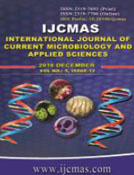


 National Academy of Agricultural Sciences (NAAS)
National Academy of Agricultural Sciences (NAAS)

|
PRINT ISSN : 2319-7692
Online ISSN : 2319-7706 Issues : 12 per year Publisher : Excellent Publishers Email : editorijcmas@gmail.com / submit@ijcmas.com Editor-in-chief: Dr.M.Prakash Index Copernicus ICV 2018: 95.39 NAAS RATING 2020: 5.38 |
The second most common type of cancer in men is prostate cancer (PCa). The incidence of PCa may vary among different ethnic groups and countries. The aim of this study is to evaluate the influence of polymorphisms in glutathione–S–transferases M1 and glutathione–S–transferases T1 genes on the risk of developing prostate cancer and benign prostate hyperplasia in a population of south of Iraq. Several polymorphic genes encoding enzymes involved carcinogenesis were studied as possible risk factor of prostate cancer. Genetic polymorphisms in glutathione–S–transferase M1 and glutathione–S–transferase T1 genes were constantly reported as a critical component on prostate cancer risk due to absence of these enzymes possibly contributed. In this study, ninety five men were participated. Fifty five patients with prostate cancer, the mean age 58.42 ± 6.83 years, forty benign prostate hyperplasia mean age 55.17 ± 5.19 years and fifty healthy control mean age 44.10 ± 9.36 years. Results show there is a highly significant difference in Chi-square levels of presents and deletions in glutathione–S–transferases M1 and glutathione–S–transferases T1 genes in all study groups. Also, Significant associations were observed among GSTM1-present + GSTT1-present (p= 0.0496) and GSTM1-null + GSTT1-present (p=0.0136), no significant associations in GSTM1-present + GSTT1-null (p= 0.207) and GSTM1-null + GSTT1-null (p=0.094).
 |
 |
 |
 |
 |